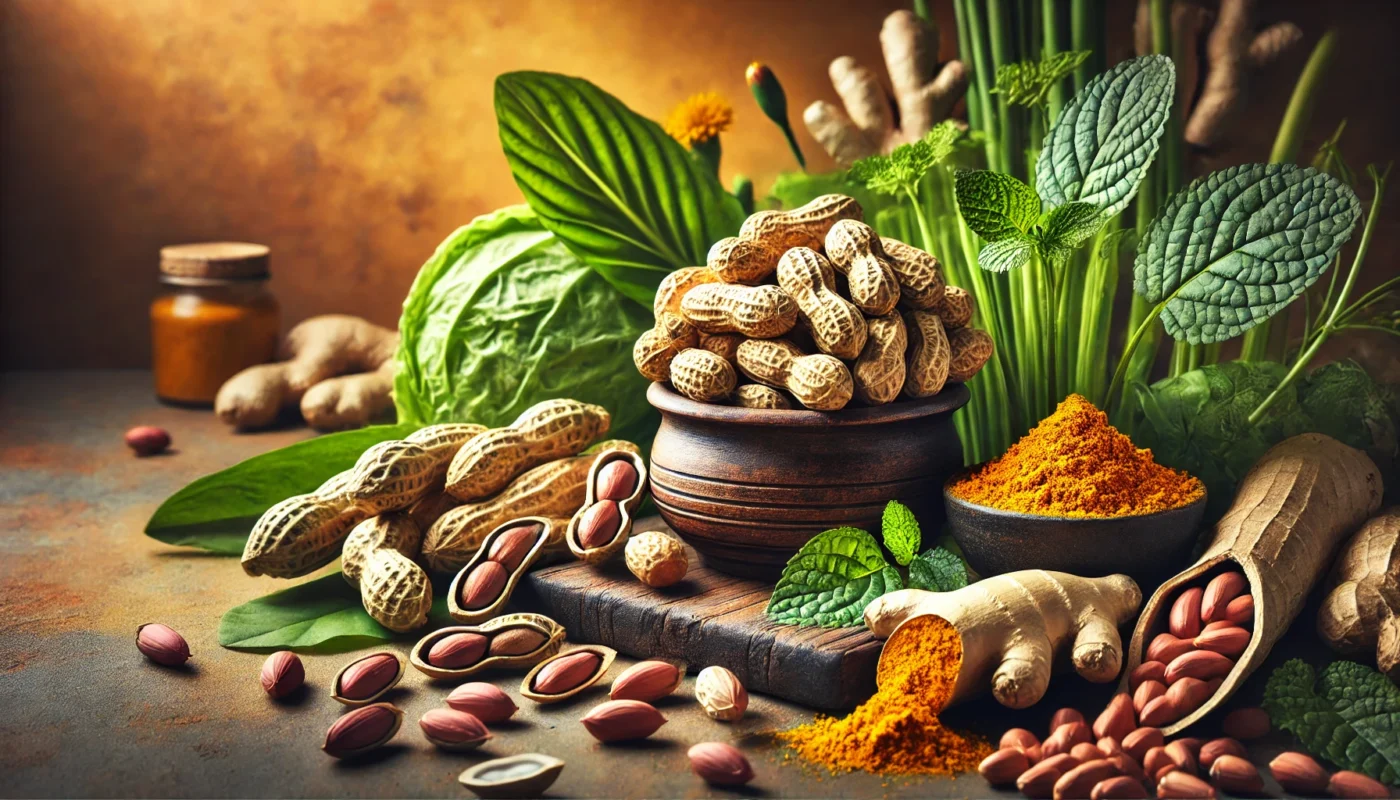Inflammation is a response of the body’s immune system to injury or infection. While it is a natural and protective mechanism, chronic inflammation is linked to a multitude of health issues, including arthritis, heart disease, and even certain types of cancer. As such, managing inflammation is crucial for maintaining overall health and wellbeing. Surprisingly, peanuts, often underestimated in nutritional discussions, can play a significant role in combating inflammation.
Tag Archives: portion control
Inflammation is the body’s natural defense mechanism, triggered by the immune system to protect against injury, infection, or toxins. It involves the release of inflammatory proteins and chemicals to facilitate healing. However, when inflammation persists, it can result in chronic conditions. The key to managing inflammation lies in balancing the body’s response, ensuring it is neither overactive nor underactive.
When the body detects an injury or harmful pathogen, the immune system springs into action. White blood cells are dispatched to the affected area, releasing chemicals that cause blood vessels to expand. This process allows more immune cells to reach the site, facilitating repair. However, this response must be carefully regulated, as an unchecked immune reaction can lead to tissue damage.
Inflammation involves a complex interplay of cellular and molecular events. Pro-inflammatory cytokines and chemokines are produced to recruit immune cells to the site of injury. Additionally, the complement system, a group of proteins in the blood, becomes activated to enhance the ability of antibodies and phagocytic cells to clear pathogens. Understanding these mechanisms is crucial for developing strategies to manage inflammation effectively.
MSG is a flavor enhancer derived from glutamic acid, a naturally occurring amino acid found in various foods like tomatoes and cheese. MSG imparts the umami taste, which is one of the five basic tastes alongside sweet, sour, bitter, and salty. It is commonly added to processed foods, fast foods, and Asian cuisine to enhance flavor.
When it comes to maintaining optimal health, the importance of a balanced diet cannot be overstated. Recent research underscores the significance of incorporating anti-inflammatory foods into our daily meals to combat chronic inflammation, a silent contributor to many health issues, including heart disease, diabetes, and arthritis. In this article, we’ll dive into nutrient-packed anti-inflammatory snacks that are not only delicious but also beneficial for your overall well-being.
In the realm of heart health, triglycerides often steal the spotlight alongside cholesterol. While cholesterol is infamous for its role in heart disease, elevated triglycerides can also be a significant risk factor. Fortunately, nature provides us with a bountiful remedy—walnuts. This article delves into the properties of walnuts and their potential as a natural solution for managing triglyceride levels.
Bursitis can be a painful condition. It’s characterized by inflammation in the bursae, small fluid-filled sacs that cushion your joints.
If you’re dealing with bursitis, you’re likely seeking ways to alleviate the discomfort. One approach that often gets overlooked is diet.
Diet plays a crucial role in managing inflammation in the body. Certain foods can exacerbate inflammation, while others can help to reduce it.
In this comprehensive guide, we’ll delve into the relationship between bursitis and diet. We’ll explore foods that can potentially worsen bursitis symptoms, and those that can help to alleviate them.
We’ll also provide practical strategies for implementing dietary changes. These strategies are designed to help manage bursitis symptoms and improve overall wellbeing.
This guide is backed by scientific research, making complex health concepts accessible and easy to understand. Whether you’re a fitness enthusiast, a health enthusiast, or a medical patient, this guide is for you.
By the end of this article, you’ll have a better understanding of how to use diet as a tool to manage bursitis pain. Let’s embark on this journey towards improved health and wellbeing together.
Ground beef is a staple in many diets. It’s versatile, affordable, and packed with protein. But is it a healthy choice or a potential inflammatory risk?
Inflammation is a natural response of our bodies. It’s crucial for healing and protecting against disease. However, chronic inflammation can lead to health problems.
Diet plays a significant role in managing inflammation. Certain foods can trigger an inflammatory response, while others can help reduce it. So, where does ground beef fit into this equation?
This article aims to answer the question: is ground beef inflammatory? We’ll delve into the scientific research and provide practical advice for those seeking to optimize their health.
We’ll also compare ground beef with other meats. Understanding the potential inflammatory effects of different meats can help you make informed dietary choices.
Whether you’re a fitness enthusiast, a health enthusiast, or a medical patient, this article is for you. It’s designed to be comprehensive, detailed, and easy to follow.
By the end, you’ll have a better understanding of the role of ground beef in your diet. You’ll be equipped with the knowledge to make choices that support your health and wellness goals.
In the quest for optimal health, the foods we consume play a pivotal role. One food that has sparked debate is rice.
Rice, a staple in many diets worldwide, has been scrutinized for its potential link to inflammation. This article aims to dissect this complex topic, providing you with a comprehensive understanding of the relationship between rice and inflammation.
Inflammation is a natural immune response, but when it becomes chronic, it can contribute to various health conditions. Diet, including the consumption of rice, can significantly influence inflammation levels in the body.
Different types of rice, such as white and brown, may have varying effects on inflammation. This is due to their distinct nutritional profiles and the way our bodies process them.
We’ll delve into the scientific research behind these claims, aiming to clarify misconceptions and provide practical advice. Whether you’re a fitness enthusiast, a health enthusiast, or a medical patient, this article will offer valuable insights.
By the end of this exploration, you’ll be equipped with actionable strategies to manage inflammation through your diet. Let’s embark on this journey to better understand the link between rice and inflammation.
Mayonnaise: a staple in many kitchens, a key ingredient in countless recipes. But have you ever wondered about its health implications? Specifically, is mayonnaise anti-inflammatory?
Inflammation is a natural response of our bodies. It’s crucial for healing and protecting against disease. However, chronic inflammation can lead to health problems.
This is where diet comes into play. Certain foods can either trigger or tame inflammation. Hence, the rise of anti-inflammatory diets.
But where does mayonnaise fit into this picture? It’s a mix of eggs, oil, and vinegar or lemon juice. Each ingredient has its own health profile.
The type of oil used can significantly impact the inflammatory potential of mayonnaise. Some oils are rich in omega-3 fatty acids, known for their anti-inflammatory properties. Others, high in omega-6, can promote inflammation if consumed in excess.
Commercial mayonnaise often contains added sugars and preservatives. These can also influence its inflammatory potential.
In this article, we’ll delve into the science behind mayonnaise and inflammation. We’ll explore its ingredients, the role of dietary fats, and how to incorporate mayonnaise into a balanced, anti-inflammatory diet. Let’s embark on this journey of discovery together.
Popcorn is a beloved snack worldwide. Its delightful crunch and versatility in flavor make it a popular choice for movie nights and casual munching.
But have you ever wondered about its impact on your health? Specifically, is popcorn inflammatory?
This question has sparked numerous debates and discussions. The internet is rife with conflicting information, leaving many confused and unsure.
In this article, we aim to clear the air. We’ll delve into the science behind popcorn and inflammation, debunking myths and misconceptions along the way.
We’ll explore the nutritional profile of popcorn, its potential inflammatory or anti-inflammatory properties, and how preparation methods can affect its health impact.
We’ll also provide practical tips on how to incorporate popcorn into a healthy diet. Our goal is to empower you with knowledge, enabling you to make informed dietary choices.
Whether you’re a fitness enthusiast, a health enthusiast, or a medical patient, this comprehensive guide is designed to help you navigate the complex world of health and wellness.
So, let’s pop the big question: Is popcorn inflammatory? Let’s find out.
- 1
- 2










